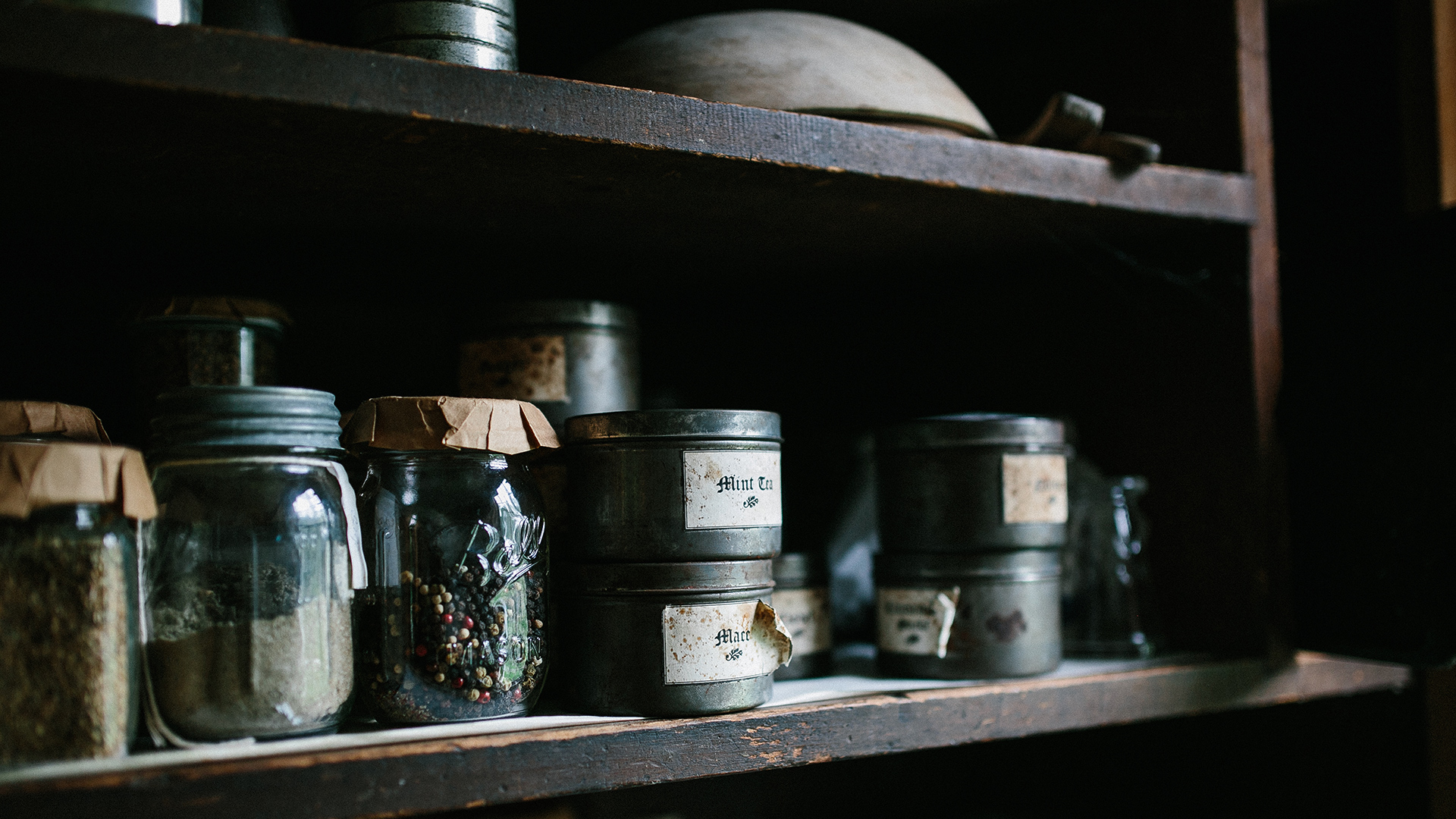
Takin’ Up a Poundin’
You can give just for giving’s sake. Or you can give to fill a need. A Christmas story from coastal North Carolina.
“I didn’t know we were poor—because everybody was poor,” Mama said every time she told this story. “It was the Depression, but that didn’t mean anything to me when I was ten.”
When Mama and her best friend Hyacinth were ten years old, what meant something to them was the smooth sidewalk in front of the Methodist Church, which was perfect for roller skating. As they skated back and forth one freezing December day, Mama and Hyacinth heard crying coming from inside the church. They pressed their ears to the door and listened hard.
“Please, Lord, I’m not asking for food for me and John, but please give us milk for the baby,” they heard the preacher’s wife pray.
The girls raced to Mama’s house, where they traded their skates for Mama’s Radio Flyer wagon.
“Where y’all goin’ in such a hurry?” my grandmother asked.
“We’re taking up a poundin’ for the preacher’s wife,” Mama called over her shoulder.
I don’t know if the custom of “takin’ up a poundin’” was peculiar to Mama’s neighborhood in Wilmington, North Carolina. I have heard it in only one other place—up the coast on Ocracoke Island. The tradition was simple: a “pounding” was when you asked folks to contribute a pound of whatever food they could spare to a neighbor in need.
Up and down the sidewalks, Mama and Hyacinth wheeled the wagon, gratefully gathering flour, corn meal, butter, eggs, beans, even a pound of bacon from kind neighbors, but no one had any milk.
“Mary Kathryn, you cannot hurt their pride,” Aunt Sarah told the girls. “You’ve got to ask them. They’ll be embarrassed that you didn’t ask them. Go on now.”
Finally, they knocked at the door of my mother’s Aunt Sarah. Mama and Hyacinth explained their mission, and told her what had been donated.
“Did you go to every house on the street?” Aunt Sarah asked.
“Yes ma’am. Well, everybody but the Brown’s. You know they haven’t got anything to give,” Hyacinth said. Mr. Brown had lost his job at the mill, and the community had taken up a pounding for his family the week before. Surely, they had nothing to offer.
“Mary Kathryn, you cannot hurt their pride,” Aunt Sarah told the girls. “You’ve got to ask them. They’re sure to hear about you doing this for the preacher’s wife, and they’ll be embarrassed that you didn’t ask them. Go on now.” Aunt Sarah shooed them off.
Reluctantly, Mama knocked softly on the Browns’ door. Mrs. Brown answered.
“Oh honey, times is hard,” she said, “and your Aunt Sarah took up a poundin’ for us last week, you know. Let me see what I can do.”
Mrs. Brown disappeared inside the house, leaving Mama and Hyacinth on the porch.
After what seemed like a long time, she returned.
“I know it ain’t much, but I hope it helps,” she said as she handed Mama two cans of evaporated milk.
I tell you this story because it tells you about Mama, and who she became, and, in turn, the kind of man she chose to marry.

Daddy was a cookie salesman, beginning his career as World War II ended. His job was going to grocery stores, taking orders, then going back to the store to stock the shelves with the cookies they had ordered. He also was tasked with delivering thank you gifts in the form of fruitcakes in decorative tins to store managers during the Christmas season.
Although “spoiled” doesn’t even begin to describe my childhood, we rarely had cookies at home. Not only was I the first grandchild born in Mama’s family, but I was the only grandchild for seven years. Showered with gifts for every occasion, I even had a harp. Where in the world did my parents find a kid-sized harp?
By the time I was four, my parents realized something needed to be done with the overflowing toys in our house. So Daddy bought a Santa suit, tied sleigh bells to the Plymouth’s hood ornament, and set about giving away my toys to other children. In that childlike way of magical thinking, there was nothing odd to me about the “real” Santa bringing me gifts, while Daddy delivered my gently used toys to other children.
The year I was five, Daddy was running late dropping off the fruitcakes. It was almost twilight on Christmas Eve, cold and raining, and he still had a couple of stops to make before he could get home to dinner, don his Santa suit, load up the car, and set off to deliver presents. Trying to appease Mama’s growing irritation, he suggested she and I ride with him to make his final deliveries.
When Daddy knocked at the family’s door, a man’s gruff voice asked, “Who is it?” “Santa Claus,” Daddy replied. “Like hell you are,” the man growled.
Mama and I waited in the car at the last grocery store, Mama fuming as freezing rain drummed down on the windshield. A girl, just a little bigger than me, ran past the car toward the store, splashing water with her bare feet.
Mama rolled the window down and hollered, “Honey, don’t you have any shoes?”
“Yes ma’am, but my sister’s wearing them today,” the child replied.
Somehow, Mama convinced the little girl to share her name, the ages of her sisters and brother, and where they lived. Somehow, between dusk and midnight, she and Daddy found toys and clothes for those children.
When Daddy knocked at the family’s door, a man’s gruff voice asked, “Who is it?”
“Santa Claus,” Daddy replied.
“Like hell you are,” the man growled.
“If you open your door, you’ll see I really am,” Daddy said.
The man opened the door, and sure enough, there stood Santa, pack on his back. Daddy said later that the only Christmas decoration in the room was a branch from a pine tree stuck in a bucket of sand, construction paper rings circling its branches.

Many years later, as my father was dying, people filled the hospital waiting room, wishing to say goodbye to him. My sister and I knew only a few of all the people who filed into Daddy’s room to pay their respects, and to thank him for some kindness we never knew he’d done.
The last stranger was a young man, burly and unkempt. He introduced himself, but his name meant nothing to us. He, however, only had eyes for my father, who now was in a coma.
He’s been so good to me for many years, even up until just a couple of weeks ago,” the man said. “He’d tell me he saw a light in me that I needed to learn to see myself. Don’t reckon he can hear me now—what I need to tell him…”
“Oh yes, he can still hear you,” I said. “I know he appreciates you coming.”
The man knelt beside the bed, and just above a whisper said, “Thank you for the shoes.”
“He’s been so good to me for many years, even up until just a couple of weeks ago,” the man said. “He’d tell me he saw a light in me that I needed to learn to see myself.”

My father tried to teach me to find common ground and light within everyone I meet. Searching for that light within others and myself has led me to one of the reasons I so love the December holidays. I love the symbolism of light that threads through so many world beliefs. I celebrate the light of Christmas and Chanukah and Kwanza with my Christian and Jewish and African American family and friends, and I celebrate the returning of the light at Winter Solstice, called Yule, with my Pagan friends and family.
Our Yule ritual on Winter Solstice is simple and joyful. Just after sunset, we begin with the house in complete darkness, offering prayers of gratitude for the harvest season just passed, and the abundant gifts in our lives. Then we light just one candle. As we reminisce and eat and tell stories and laugh, we continue to light more candles. We light the fireplace fire and the Yule log, starting the fire with the small piece of last year’s log, saved just for this purpose, reminding us that the Wheel of the Year spins and spins ever onward and that every being is connected to every other being on Mother Earth. Suddenly, the house is ablaze in light, and we celebrate the promise and hope and light of the days to come.
About the author
Deb Bowen lives and writes on a North Carolina barrier island. She is the co-author of "A Good Friend for Bad Times: Helping Others Through Grief." She has a novel and several other works in progress.






This is such a beautiful reflection! Thank you for spreading the generous holiday spirit.
Hi Shannon, thank you so much for reading my work and I appreciate your kind thoughts about it. I hope you’ll read my other work in Salvation South as well. You’ve made my day!
Blessings,
Deb
Deb, You always help readers find the Light. Thank you.